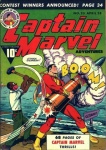 Confessions of a Comic Book Guy is a weekly column by Steve Bennett of Super-Fly Comics and Games in Yellow Springs, Ohio. This week, Bennett looks back at the way Golden Age comics handled the issue of race:
Confessions of a Comic Book Guy is a weekly column by Steve Bennett of Super-Fly Comics and Games in Yellow Springs, Ohio. This week, Bennett looks back at the way Golden Age comics handled the issue of race:It has been brought to my attention that I shouldn't have taken Grant Morrison's remarks (see "When Geeks Get Power, You Get Hitler") as personally as I did but not only do I resemble his remarks I must confess what really hurts is I'm a fan of his. I've followed his career going all the way back to the first volume of Zenith and while he's always had a predilection for the visceral and outré his work has been balanced by a keen appreciation for the human condition.
This, I suppose, is why his cheap shot came as such a slap to the face.
Mr. Morrison is of course free to say what he wishes, even if it means likening us to Hitler (why not; everyone else seems to be playing LET'S COMPARE EVERYONE TO HITLER, the cool new game that's sweeping the nation) but to do so shows a staggering lack of insight. I can only assume he was never one of us, either that or he's become so successfully assimilated into his international man of mystery persona he's forgotten the obvious: that no one chooses the Mighty Thor over girls; sometimes it's the only thing on the menu.
And now that we're all comfortable again the middle class, middle-aged white guy would like to write about race again.
Something else I never thought I'd live to see is an official DC release of Mister Mind and the Monster Society, a serial which ran in Captain Marvel Adventures during the 1940's. It's both legendary amongst Golden Age aficionados for being the first great comic book epic and notorious for its grotesque racist stereotypes which have made it, up until now, impossible to collect. I'm not sure exactly what's changed, perhaps it's because we're all now living in a post-racial America but DC Comics Library: Shazam Monster Society of Evil will be coming out later this year, just in time to miss being my Christmas present to myself.
The racist stereotypes are pretty much what you'd expect from a Golden Age comic book; the usual assortment of fiendish Japanese villains and your standard issue lackadaisical ghost-phobic black servant. I speak of course of Steamboat, the unemployed boat captain who found himself in the employ of Billy Batson, twelve year old newscaster, though not for long.
In Alter Ego Collection Volume One there's an article by principal Captain Marvel artist C.C. Beck* profiling all of the major Marvel Family characters. This is what he wrote about Steamboat: "...this character was created to capture the affection of black readers. Unfortunately, he offended them instead and was unceremoniously killed off after a delegation of blacks visited the Fawcett editor's office protesting because he was a servant, because he had huge lips and kinky hair, and because he spoke in a dialect. He was always a cartoon character, not intended to be realistic at all, but he was taken seriously by some, sadly enough."
In the Fawcett Companion there's an interview with longtime Captain Marvel writer Otto Binder who equated Steamboat with other comic dialect speaking characters; "We never meant to degrade them, merely play them for humor. We thought it was kind of sad that the public couldn't distinguish between harmless well-meant-dialect-characters and true racial antipathy".
And, coincidentally enough, in the current issue of Alter Ego in Fawcett artist Mac Swayze's regular column the subject of Steamboat comes up; "I liked Steamboat, but he had to go. It was the role he played... that humble domestic of lowly esteem. People didn't like it."
What all these comments have in common is a remarkable obliviousness to the ugly, obvious truth. It of course wasn't his dialect or the fact that he was a servant that offended people most; it was the demeaning, dehumanizing way that Steamboat was drawn. How is it possible for them to not realize that?
In a 2003 interview with Will Eisner (ironically titled "Never Too Late") in Time about his then new book Fagin the Jew, the subject of his stereotypical depiction of The Spirit's sidekick Ebony White came up. As far as I know the closest Eisner has ever come to apologizing for Ebony came in this statement: "The only excuse I have for (that portrayal) is that at the time humor consisted in our society of bad English and physical difference in identity."
Will Eisner was unquestionably a genius, but he was also a man of his time and I suppose the closest we'll ever come to understanding why men of that era could tolerate something which seems to us to be so obviously wrong is by accepting the bromide "that's just the way things were." That can never be used as a free pass but I believe we've reached a point in our history where it's as important to understand our past as it is to judge it.
* Full disclosure compels me to reveal a prior relationship with Mr. Beck. Back in the early 70's when he'd quit the DC comic book Shazam over creative differences with the editors I wrote him a letter, pouring out all of my adolescent outrage. And I mentioned, in passing, that I had heard of but had never seen an earlier work of his, Fatman - The Human Flying Saucer. A couple of weeks later I received a manila envelope containing all three published issues and a nice note from Beck saying I should return them after I was done reading them. C.C. Beck apparently had a well deserved reputation for being cantankerous but what I'll always carry with me is he once did something nice for someone he didn't know for no other reason than to be nice.
The opinions expressed in this column are solely those of the writer, and do not necessarily reflect the views of the editorial staff of ICv2.com.








